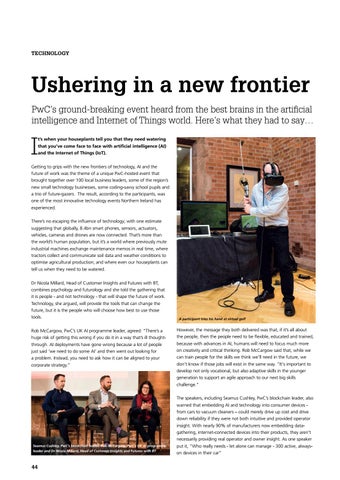TECHNOLOGY
Ushering in a new frontier PwC’s ground-breaking event heard from the best brains in the artificial intelligence and Internet of Things world. Here’s what they had to say…
I
t’s when your houseplants tell you that they need watering that you’ve come face to face with artificial intelligence (AI) and the Internet of Things (IoT).
Getting to grips with the new frontiers of technology, AI and the future of work was the theme of a unique PwC-hosted event that brought together over 100 local business leaders, some of the region’s new small technology businesses, some coding-savvy school pupils and a trio of future-gazers. The result, according to the participants, was one of the most innovative technology events Northern Ireland has experienced. There’s no escaping the influence of technology; with one estimate suggesting that globally, 8.4bn smart phones, sensors, actuators, vehicles, cameras and drones are now connected. That’s more than the world’s human population, but it’s a world where previously mute industrial machines exchange maintenance memos in real time, where tractors collect and communicate soil data and weather conditions to optimise agricultural production; and where even our houseplants can tell us when they need to be watered. Dr Nicola Millard, Head of Customer Insights and Futures with BT, combines psychology and futurology and she told the gathering that it is people - and not technology - that will shape the future of work. Technology, she argued, will provide the tools that can change the future, but it is the people who will choose how best to use those tools. Rob McCargow, PwC’s UK AI programme leader, agreed: “There’s a huge risk of getting this wrong if you do it in a way that’s ill thoughtthrough. AI deployments have gone wrong because a lot of people just said ‘we need to do some AI’ and then went out looking for a problem. Instead, you need to ask how it can be aligned to your corporate strategy.”
Seamus Cushley, PwC’s blockchain leader, Rob McCargow, PwC’s UK AI programme leader and Dr Nicola Millard, Head of Customer Insights and Futures with BT
44
A participant tries his hand at virtual golf
However, the message they both delivered was that, if it’s all about the people, then the people need to be flexible, educated and trained, because with advances in AI, humans will need to focus much more on creativity and critical thinking. Rob McCargow said that, while we can train people for the skills we think we'll need in the future, we don't know if those jobs will exist in the same way. “It's important to develop not only vocational, but also adaptive skills in the younger generation to support an agile approach to our next big skills challenge.” The speakers, including Seamus Cushley, PwC’s blockchain leader, also warned that embedding AI and technology into consumer devices from cars to vacuum cleaners – could merely drive up cost and drive down reliability if they were not both intuitive and provided operator insight. With nearly 90% of manufacturers now embedding datagathering, internet-connected devices into their products, they aren’t necessarily providing real operator and owner insight. As one speaker put it, “Who really needs - let alone can manage - 300 active, alwayson devices in their car”
